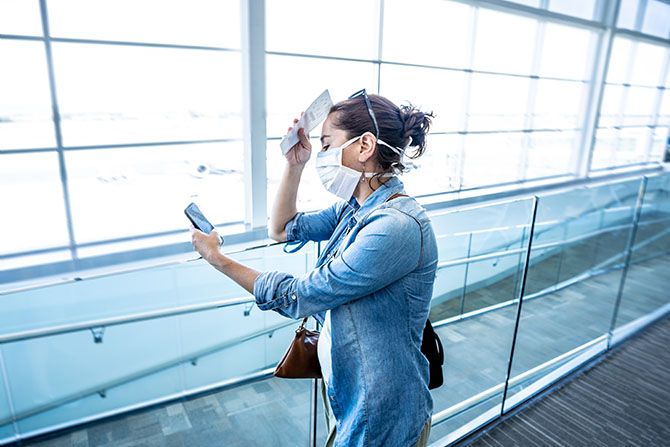The holiday season is a time when many people enjoy tuning out the news, relaxing with friends and family, and forgetting their worries. However, in 2022, one of the staples of the holidays, plane travel, turned into a news story that proved impossible to ignore. Southwest Airlines, often ranked as the top American economy and budget airline, suffered a complete meltdown that, in a system with even a little accountability for corporate actors, would have the company looking at serious consequences. It is worth looking into what led to Southwest’s cascading problems and how truly dangerous short-sighted economic and business practices can ultimately be.
To summarize what unfolded, Southwest’s recent difficulties hit a crescendo around Christmas, forcing the airline to cancel approximately 15,000 flights around the holidays, including almost 70% of the flights scheduled for the two days following Christmas. The cancellations left waves of travelers stranded in airports, scrambling for accommodations, and even stranded many Southwest crew members. Southwest is a microcosm of America’s airline industry, a small group of corporations that are allowed to act with total impunity. Airline companies’ service and customer satisfaction only get worse; they only make the experience more unpleasant each year, yet their bottom lines keep getting larger and larger. As it does in so many areas, our government has created conditions where these airlines feel like no deed, no matter how egregious, will ever be punished.
Southwest’s own employees have also called out the company’s business practices, most notably in a letter from the Southwest Airlines Pilot Association dated January 3. Captain Tom Nekouei, vice president of the Association, claims that former CEO and chairman Gary Kelly has spearheaded constant underinvestment in the company’s infrastructure, leading to repeated meltdowns over the past 15 years. This underinvestment has led to short staffing, outdated technology, and an inefficient plane-routing system. Nekouei lays out a familiar scenario in the letter: a refusal on behalf of the executives at the top to invest capital in a company’s infrastructure in order to juice short-term profits, leading to consequences down the line. In the letter, Nekouei states that the Pilot Association “has been beating this drum to management for nearly a decade pleading with them to spend the necessary capital to prevent the ultimate consequence someday. As CEO, Gary Kelly made a conscious decision to make the less-than-necessary investments in tech upgrades in favor of maximizing shareholder return because, well, ‘our tech’s been working OK for 20 years.’”
It’s frightening that an industry like air travel, which is so dependent on the precision of the crew and equipment, is now comfortably in the domain of corporate cost-cutting. If executives are willing to cut corners on staffing and technology, then it is only a matter of time before corners are cut on the planes themselves. This is the kind of erosion in integrity and trust that greed can ultimately lead to. If powerful actors aren’t truly held to account, then what is to prevent them from trying to get away with a little bit more? If the airline executives aren’t listening to their pilots, the individuals literally in the cockpits, then who will they listen to? Air travel is not exactly a low-stakes industry, so it’s worrisome when profit is clearly winning out over quality.
It’s no secret that the airline industry, particularly in the last decade, has been wildly dependent on stock buybacks to give the appearance of greater economic viability. In a stock buyback, a company will choose to purchase its own shares from shareholders, and it will take these shares entirely from the market. That gives money to shareholders and lowers the number of shares outstanding. This will temporarily increase, for example, the reported earnings per share because you are basically dividing the same earnings number by a lower number of shares outstanding. According to an article from Business Insider, “Stock buybacks have been particularly prevalent in the airline industry over the last ten years or so. Airlines like American and Delta poured billions into stock buybacks in the years before the pandemic. For instance, in 2019, American spent $12.6 billion paying its employees. But, from 2013 to 2019, they spent $12.9 billion on stock buybacks.”
According to Sara Nelson, the international president of the Association of Flight Attendants, “There was so much pressure on the airlines to announce these huge stock buybacks as they were trying to encourage people to invest in airlines again. But a huge portion of the profits went to stock buybacks that don’t reinvest in the company, that don’t contribute to the long-term success of the airline, that don’t invest in the workforce.” When the pandemic hit in early 2020, there was significant pushback against the airline industry asking for billions in bailout money when they had been pouring billions into stock buybacks. For instance, in March 2020, Bloomberg found that the largest airlines had spent a stunning 96% of their cash flow on stock buybacks over the previous decade.
At the beginning of the pandemic, Nelson and other industry advocates pushed for a ban on stock buybacks for airline companies. However, they were only able to secure a temporary ban that ended in August of 2022. Nelson says that, while it’s incredibly irresponsible and short-sighted for airline companies to put initial pandemic profits directly into stock buybacks, it has become the expected modus operandi for the industry, completely free of consequence. “Congress should be looking at what it looks like when you actually have a company focused on the business,” she said, “and not constantly having pressure from investors to siphon off those profits for short-term gain for investors and long-time harm to the company — direct harm to the people on the front lines and the customers who are trying to get a service.”
When an industry is not investing capital into its infrastructure and its employees, meltdowns like the one Southwest experienced should be expected. These are inexcusable business practices that can only be defended in a context where profit is the only thing that matters. When an industry – and Southwest is just the most egregious example of an industry-wide problem – is this untethered from basic tenets of business, then it becomes enormously concerning, particularly when it’s one that depends on safety and quality control as much as the airline industry.
In light of recent developments, a bipartisan group of attorneys general sent an eight-page letter to Transportation Secretary Pete Buttigieg in December 2022, urging Buttigieg to strengthen proposed rules in response to the growing problem of flight cancellations and significant delays. The recommendations in the letter include the following:
- Requiring airlines to advertise and sell only flights that they have adequate personnel to fly and support, and to perform regular audits of airlines to ensure compliance and impose fines on airlines that do not comply;
- Making it clear that USDOT will impose significant fines for cancellations and extended delays that are not weather-related or otherwise unavoidable;
- Prohibiting airlines from canceling flights while upselling consumers more expensive alternative flights to the same destinations;
- Requiring that credits and vouchers for future travel that are provided by airlines in the event of cancellation can be used easily without inappropriate limitations.
The letter makes a number of excellent recommendations that may curb certain issues. Still, it’s a matter of the Department of Transportation actually enforcing them and having mechanisms to make airline companies truly reform. Americans are used to politicians making a lot of empty promises, warning of the consequences of corporate malfeasance without actually following through. This is the baseline expectation at this point, sadly. The Southwest holiday fiasco provided Americans with a real-time, concrete example of how cutting corners and short-term thinking can prove disastrous down the line. We rarely see this kind of lightning-bolt moment, where everything hits a crescendo so blatantly. It allows us to understand that when profit becomes so all-consuming that a company can’t even focus on the core elements of its business model, there needs to be serious reform before we reach even more severe crisis points.







